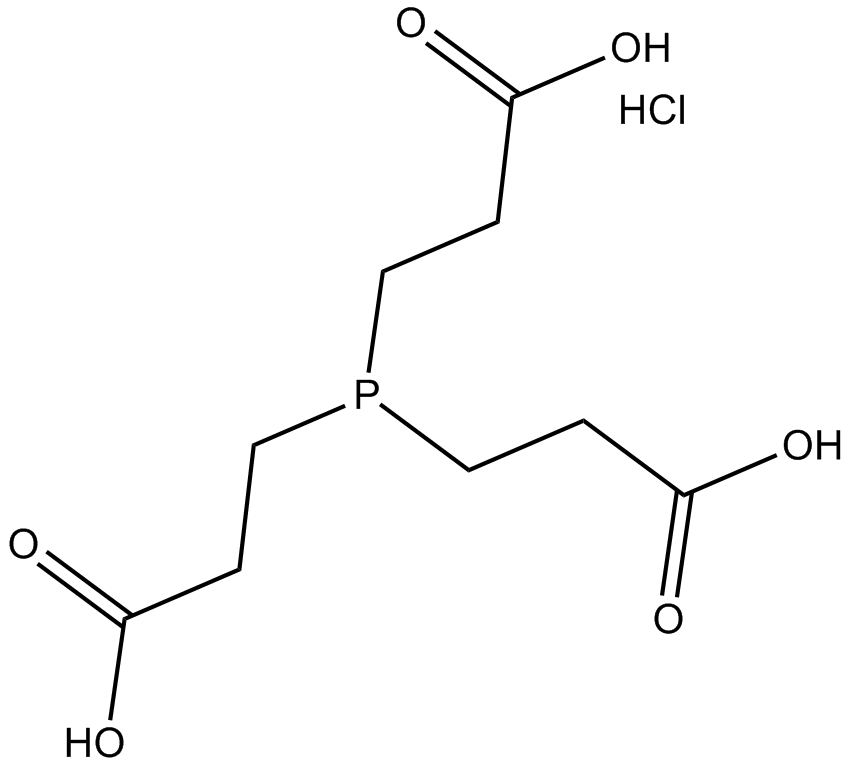TCEP hydrochloride (Synonyms: Tris(2carboxyethyl)phosphine) |
| Catalog No.GC10529 |
TCEP hydrochloride is a non-thiol reducing agent which does not bind Hg(2+).
Products are for research use only. Not for human use. We do not sell to patients.

Cas No.: 51805-45-9
Sample solution is provided at 25 µL, 10mM.
TCEP hydrochloride is a non-thiol reducing agent which does not bind Hg(2+).[1] TCEP hydrochloride increased SOD1 monomer formation, thus preventing the NO‐induced increase in dismutase activity and the decrease in ROS.[5]
In vitro efficacy test it shown that TCEP hydrochloride promoted NF-kappaB-DNA binding in a dose-related manner in concentrations from 0.25 to 6mM. with 6mM TCEP hydrochloride , Hg(2+) prevented NF-kappaB-DNA binding at concentrations as low as 20 microM in binding reactions.[1]
In vitro experiment it indicated that treatment with 100 μM TCEP hydrochloride-HCL can improve the quality and developmental capacity of in vitro-fertilized embryos by decreasing oxidative stress in porcine oocytes.[2] In human neuronal cell line, SHSY-5Y, with 1 mM TCEP hydrochloride maximally protected against BoNT/B inhibition of [(3)H]-NA release, and has no toxic.[3] TCEP hydrochloride (0.01 mM) does not scavenge Fe(3+) from Tf and is able to protect thiol groups for the coupling to maleimide. In addition, TCEP hydrochloride does not interfere with the maleimide coupling itself.[4] In vitro, human hepatocellular (HepG2) cells were treated with 100, 200, and 400 μM TCEP hydrochloride for 3 days, the level of oxidative stress, esterase, Ca2+ influx, and ΔΨm dysfunction increased. And there were 65.96% subG1 apoptotic peak in 400 μM treated cells.[6]
In vivo, treatment with 20 mg/kg and 60 mg/kg TCEP hydrochloride orally in adult ICR mice for 9 weeks, TCEP improved body weight gain, hypertriglyceridemia, and hepatic steatosis, consistent with upregulation of hepatic lipogenesis-related gene expression. TCEP also altered the levels of several hepatic metabolites.[7]
References:
[1].Dieguez-Acuña FJ, et al. Inhibition of NF-kappaB-DNA binding by mercuric ion: utility of the non-thiol reductant, tris(2-carboxyethyl)phosphine hydrochloride (TCEP hydrochloride), on detection of impaired NF-kappaB-DNA binding by thiol-directed agents. Toxicol In Vitro. 2000 Feb;14(1):7-16.
[2]Zeng Y, et al. Effects of tris (2-carboxyethyl) phosphine hydrochloride treatment on porcine oocyte in vitro maturation and subsequent in vitro fertilized embryo developmental capacity. Theriogenology. 2021 Mar 1;162:32-41.
[3]Shi X, et al. TCEP hydrochloride treatment reduces proteolytic activity of BoNT/B in human neuronal SHSY-5Y cells. J Cell Biochem. 2009 Aug 1;107(5):1021-30.
[4]Visser CC, et al. Coupling of metal containing homing devices to liposomes via a maleimide linker: use of TCEP to stabilize thiol-groups without scavenging metals. J Drug Target. 2004;12(9-10):569-73.
[5]Peng H, et al. Nitric oxide inhibits endothelial cell apoptosis by inhibiting cysteine-dependent SOD1 monomerization. FEBS Open Bio. 2022 Feb;12(2):538-548.
[6]M Al-Salem A, et al. Tris(2-chloroethyl) Phosphate (TCEP) Elicits Hepatotoxicity by Activating Human Cancer Pathway Genes in HepG2 Cells. Toxics. 2020 Nov 20;8(4):109.
[7]Yang D, et al. Tris (2-chloroethyl) phosphate (TCEP) induces obesity and hepatic steatosis via FXR-mediated lipid accumulation in mice: Long-term exposure as a potential risk for metabolic diseases. Chem Biol Interact. 2022 Aug 25;363:110027.
Average Rating: 5 (Based on Reviews and 6 reference(s) in Google Scholar.)
GLPBIO products are for RESEARCH USE ONLY. Please make sure your review or question is research based.
Required fields are marked with *




















